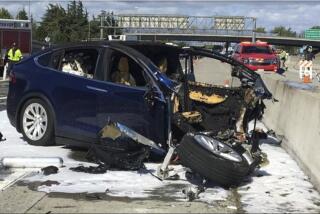High Tech: Auto Makers’ History Revisited
- Share via
Everybody knows the automobile industry is tired, old, dumb, eastern and a symbol of rusted-out smokestack America. And the computer industry represents a youthful, glistening, brainy, electronic, westward-facing vision of the future.
But if they’re so different, how come they behave so much alike?
Perhaps it’s inevitable. The computer is supplanting the automobile as our favorite inanimate object; kids brag to their friends about the family’s new Apple IIc instead of the Buick Roadmaster.
About 3,000 auto companies, many of them in people’s garages, have started and failed in this country. Now, we’re down to four U.S.-based car manufacturers. Meanwhile, we have about 500 computer companies and 4,000 software outfits, many of them still in people’s garages. A few years hence, everyone says, we’ll be down to a handful of computer makers.
One reason so many people leaped into these industries is that they thought Americans would buy every car and computer that was cranked out. People were buying so many cars in the 1920s that the auto moguls geared up for imminent sales of 6 million cars a year. Alas, that level wasn’t reached until 1955, and car producers by the hundreds fell by the wayside.
Disappointing Sales
Commenting on the shakeout accompanying last year’s disappointing small-computer sales, computer industry consultant Edward Yourdon says: “The analogy of Detroit’s hysterical optimism with personal-computer sales should be an obvious one.”
The small-computer industry is cheerfully embarked on the same marketing trickery by which Detroit and its dealers have managed to antagonize millions of Americans over the years: the irrelevant starting price.
You’re hard-pressed to find the $4,995 car you saw hawked in the newspapers. And a computer won’t even run at the starting price. A computer without software (that’ll be $495 extra, please) is like a car without a steering system. The external disk drive is the turbocharger of the computer industry; the color monitor is the vinyl roof. In both industries, that’s where the money is.
Meanwhile, it is possible to “test drive a Macintosh” (though there apparently haven’t been many takers of that marketing offer by Apple Computer Inc.). As car buffs can get lusher floor mats from an auto-parts store, techies can buy an independently made keyboard instead of the factory one. Someone in Santa Barbara has introduced the “Brown Book,” a guide to used-computer prices similar to the used-car “Blue Book.”
Apple made a big splash by giving thousands of computers to schools and colleges, figuring that those kids would demand Apples at home, too. The gimmick recalls Detroit’s bargain-rate distribution of millions of cars over the last 30 years for driver-education programs, familiarizing teen-agers with its cars.
Both Self-Important
Car and computer people share views on the issues of the day, such as how important they are to civilization. Their answer in each case: very.
While many computer executives publicly eschew any notion of Detroit-style import protection, it should be noted that Silicon Valley hasn’t yet been passed up by the Japanese. But this country’s high-tech trade balance is in the red this year for the first time. Consultant Yourdon predicts that, as computers become as politically powerful as autos and steel, they will demand, and get, government barriers against computer gear from Nepal, or wherever they’re paying workers the worst wage.
On wages, Detroit is borrowing ideas from Cupertino. It was 22 years ago when Fairchild Camera & Instrument Corp., the semiconductor pioneer, started exporting jobs to Hong Kong; Atari carries on the tradition with its video games. Now, small-car production is moving to low-wage Japan, Korea and Mexico.
Meanwhile, Japanese software, if less creative, is reputed to be much more reliable than U.S. software. Is that an echo? The Japanese, in fact, have been buying American computer textbooks for years, just as they’ve been touring U.S. auto factories. They apparently pay close attention: California’s Tandon Corp. last month accused Sony Corp. and Mitsubishi of infringing its floppy-disk-drive patent, as General Motors Corp. in 1977 successfully sued Toyota for infringing on the patent for its catalytic converter.
Of course, the GM of the small-computer industry is International Business Machines Corp. Ford Motor Co., which built the first car for the masses in 1908, is mirrored by Apple, which pioneered the computer for Everyman in the late 1970s. The Chrysler Corp. counterpart in small computers is less obvious, but maybe it’s Compaq: Both are in third place, and until lately, both were continually being consigned by industry observers to oblivion.
Other Similarities
GM and IBM waded into the markets created by Ford and Apple and dominated them in short order, extinguishing small competitors with economies of scale and marketing clout. Even their customers are similar, one gathers: slightly stodgy, inclined toward the safe choice. If you can’t trust GM and IBM, whom can you trust?
The resurrection of IBM’s PCjr--overpriced, underpowered and ridiculed at its introduction a year ago--borrowed a page from GM’s 1982 resurrection of its Chevrolet Cavalier and other J-cars, which were overpriced, underpowered and ridiculed at their introduction. Today, their prices slashed and problems diminished, the two products have been muscled into the success column.
Women have made unmistakable marks in both arenas. Wall Street’s Maryann Keller, a noted auto analyst, and Esther Dyson, author of a pricey computer newsletter, are more influential than many top company executives.
Here are samples of their peculiarly feminine commentaries. Keller, discounting a supposed “pent-up demand” for new cars during a 1981 sales slump: “I have a pent-up demand for a five-carat emerald, but I can’t afford it.” Dyson on the Apple Macintosh computer: “The Macintosh is like a Dior gown. People like to look at it, but not a lot are buying.”






